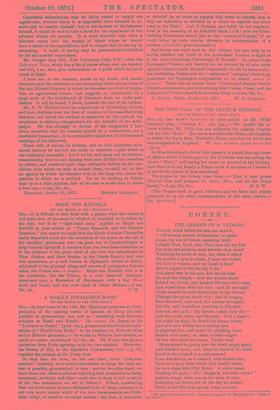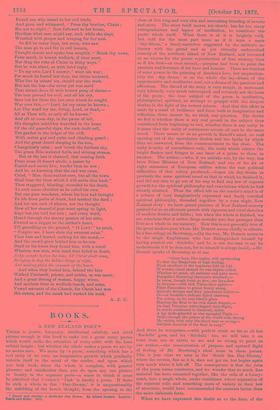POETRY.
THE LEGEND OF S. VITALIS.* VITAL'S stood before his cell and mused ; "'Of women cometh wickedness,' so spake Jesus, the son of Sirach, speaking truth. I thank Thee, Lord, that Thou hast led my feet Far from the perilous ways wherein they stand Watching for souls of men, for, since I closed My mother's eyes in death, I have not looked On face of woman, and my heart is fixed Not to regard it till the day I die."
And peace was in his soul, but ere he slept He read the Gospel, —how the woman stood Behind the Christ, and washed His feet with tears, And wiped them with her hair ; and all the night Christ seemed to walk beside him in his dreams Through the great sinful city ; foul of tongue, Bare-bosomed, evil-eyed, the women thronged ; But He, with boundless yearning in His eyes, Pointed, and said, "My sisters,—shall they die?" And the monk woke, and thought, 'it is a snare ;' But night by night he found the dream return, And ever saw within the yearning eyes A mightier love, and heard the pleading voice Broken with tears ; so, after counsel sought Of him who ruled the house, Vitalis went.
Much mused he going how the work might speed, And doubted much, and, when he reached the town, Stood in the turmoil as a man amazed.
Then wandering, as it seemed, with aimless feet, Came to a quay from which they loaded wheat On corn-ships bound for Rome. A sailor cried, Mocking his garb, "Ho! sluggard, wilt thou work ?" And the rough voice was as the voice of God, Scattering his doubt, for all the day he worked Hard, as for life, then going, wage in hand, * The story is taken from the January volume of Mr. Baring-Gould, "Lives of the Saints."
Found one who issued to her evil trade, And gave, and whispered, "From thy brother, Christ ; Sin not to-night ;" then followed to her house, Heedless what men might say, and, while she slept, Wrestled with prayer and weeping for her soul.
So did he many days, but some, who saw The man go to and fro in evil haunts,
Thought shame and spake him roughly, "Break thy vows,
False monk, in honest wedlock, if thou must, Nor drag the robe of Christ in filthy ways."
But he was silent, or with brief reply, "To my own Lord I answer," went his way ; For much he feared lest they, the thrice accursed, Who live by others' sin, should mar the work.
But not the less—for never yet was maid
That shrank from ill with keener pang of shame—The iron pierced his soul, and all his cry,
Save but for those the lost ones whom he sought, Was ever this,—" Lord, let my cause be known ;
Let Thy word try me, living, Lord, or dead,—
All as Thou wilt, so only all be known."
And oft at noon-day, in the pause of toil, His thoughts unbidden travelled to the home Of the old peaceful days, the rock-built cell, The garden in the ledges of the cliff, With melon gay and pulse and climbing gourd ; And the great desert sleeping in the sun, Changelessly calm ; and 'neath the furthest sky, The green Nile-watered fields and shining stream.
But at the last it chanced, that coming forth From some ill-famed abode, a passer-by Espied and smote him, harder than he wot ; And he, as knowing that the end was come, Cried, "Man, thou smitest sore, but all the town Shall hear the blow which I will smite thee back."
Then staggered, bleeding, wounded to the death, To such mean chamber as he called his own.
But one poor wanderer, whom his love had brought To life from paths of death, had marked the deed ; And her nor oath of silence, nor the thought How all her shameful past must spring to light, Kept but she told her tale ; and every word, Heard through the stormy passion of her sobs, Pierced as a dagger to the striker's heart, Till grovelling on the ground, " 0 Lord !" he cried, "Forgive me, I have slain thy sweetest saint."
Then rose and haste& seeking for the monk,—
And the crowd grew behind him as he ran.
Dead on his knees they found him, with a scroll Whereon was writ, with hand that failed in death, Judge nought before the time, till Christ shall come, Bringing to day the hidden things of night, And making plain the counsels of the heart.
And when they buried him, behind the bier Walked Patriarch, priests, and nobles, as was meet ; And a great throng of women, happy wives, And mothers blest in wedlock-bands, and some, Vowed servants of the Church, for Christ had won His sisters, and the monk bad worked his work. A. J. C.



































 Previous page
Previous page